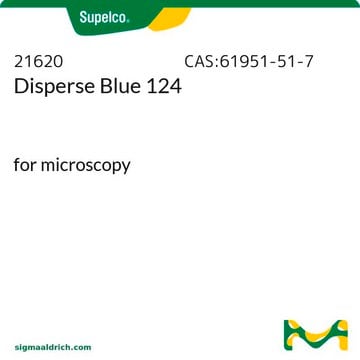53882
Disperse Orange 3
analytical standard
Synonym(s):
4-(4-Nitrophenylazo)aniline
About This Item
Recommended Products
grade
analytical standard
Quality Level
Assay
≥96.0% (HPLC)
technique(s)
HPLC: suitable
gas chromatography (GC): suitable
mp
~200 °C (dec.) (lit.)
λmax
443 nm
application(s)
cleaning products
cosmetics
environmental
food and beverages
personal care
format
neat
SMILES string
Nc1ccc(cc1)\N=N\c2ccc(cc2)[N+]([O-])=O
InChI
1S/C12H10N4O2/c13-9-1-3-10(4-2-9)14-15-11-5-7-12(8-6-11)16(17)18/h1-8H,13H2/b15-14+
InChI key
UNBOSJFEZZJZLR-CCEZHUSRSA-N
Looking for similar products? Visit Product Comparison Guide
General description
Application
Features and Benefits
Signal Word
Warning
Hazard Statements
Precautionary Statements
Hazard Classifications
Eye Irrit. 2 - Skin Irrit. 2 - Skin Sens. 1 - STOT SE 3
Target Organs
Respiratory system
Storage Class Code
11 - Combustible Solids
WGK
WGK 3
Flash Point(F)
Not applicable
Flash Point(C)
Not applicable
Personal Protective Equipment
Choose from one of the most recent versions:
Already Own This Product?
Find documentation for the products that you have recently purchased in the Document Library.
Our team of scientists has experience in all areas of research including Life Science, Material Science, Chemical Synthesis, Chromatography, Analytical and many others.
Contact Technical Service









